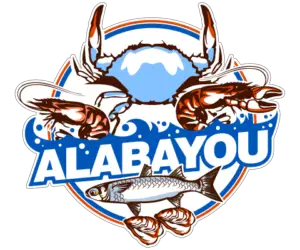As an expert in saltwater fishing, I can tell you that choosing the right bait can make all the difference in catching a big fish or coming up empty-handed.
So what is the best bait to use when saltwater fishing? The best bait for saltwater fishing is live bait, which can include shrimp, small croaker, mullet, fiddler crabs, and other types of live bait commonly used in saltwater fishing.
Before we dive into the best types of bait for saltwater fishing, it’s important to understand what bait is and why it’s essential for fishing.
Bait is any type of food or lure that is used to attract fish to your line. It can be natural or artificial, and it can be used in various ways, such as live bait, cut bait, or lures.
In this blog post, I will provide you with the ultimate guide to choosing the best bait for saltwater fishing, based on my years of experience growing up on my grandfather’s shrimp dock in Bayou La Batre, AL.

Choosing the Right Saltwater Fishing Bait
There are several factors to consider when choosing the right bait for saltwater fishing. These include the type of fish you are trying to catch, the water conditions, and the time of day. Let’s take a closer look at each of these factors.
Type of Fish
Different types of fish are attracted to different types of bait. For example, if you are trying to catch redfish, you might want to use live shrimp or cut mullet.
If you are trying to catch flounder, you might want to use a live mud minnow or a jig with a soft plastic tail. Research the specific fish you are targeting and find out what bait is most effective.

If you’re interested in discovering the finest fish options from the Gulf Coast, don’t miss out on our latest article highlighting the 21 Best Fish to Eat – it’s a must-read!
Water Conditions
The water conditions, such as the depth and clarity of the water, can also affect what type of bait you should use.
If the water is shallow and clear, you may want to use smaller lures or natural baits, as the fish may be more easily spooked.
If the water is deeper or murky, you may want to use larger lures or brighter colors to attract the fish’s attention.
Time of Day
The time of day can also play a role in what type of bait you should use. Some fish are more active during certain times of the day, such as dawn or dusk.
Additionally, the sun’s position in the sky can affect the visibility of your bait. If the sun is high in the sky, you may want to use brighter or more reflective lures to attract the fish’s attention.
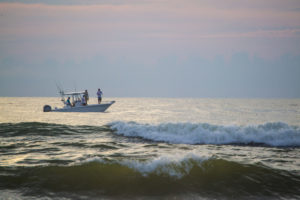
Types of Saltwater Fishing Bait
Now that we’ve covered the factors to consider when choosing the right bait for saltwater fishing, let’s take a look at the different types of bait available.
Live Bait for Saltwater Fishing
Live bait is one of the most effective types of bait for saltwater fishing. It can be purchased at bait shops or caught yourself.
Some common types of live bait include shrimp, mullet, mud minnows, and crabs. Live bait can be used with a variety of rigs, such as a Carolina rig, a popping cork rig, or a slip sinker rig.
*Pro Tip: Avoid Using Chemicals on Your Hands When Handling Bait
Shrimp: A Versatile and Effective Saltwater Bait
When it comes to saltwater fishing, shrimp is a go-to bait for many anglers. This all-purpose bait is effective because shrimp are common in saltwater environments, and fish are naturally attracted to both their scent and movement.
Shrimp, whether dead or alive, can be used to catch fish onshore or offshore. Since shrimp can attract fish of all sizes, even big fish are likely to take a bite of smaller ones, making it a versatile option.
However, it’s worth noting that shrimp can get expensive as bait, but it does usually yield results. Speckled Trot, redfish, and a number of other fish love shrimp, so it’s a bait that every saltwater angler should consider.
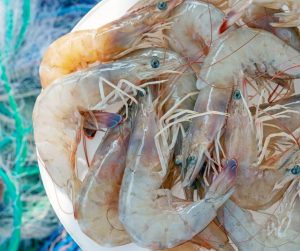
Shellfish: A Versatile and Scented Option
Many different species of fish are attracted to shellfish, such as clams, mussels, or crabs. Anglers often choose shellfish as bait because of its versatility when trying to catch a fish.
However, clams can be slippery, so some anglers let shellfish harden in the sun on the hook for optimal results. Sheepshead and other fish are attracted to the scent of shellfish, making it an effective bait option.
However, crabs require special handling to prevent having a claw clamp down while putting it on a hook.
Nonetheless, it’s worth the effort when trying to catch cobia or big drum. Anglers often catch shellfish to use as bait, but make sure to check with local laws beforehand, as some mussels, clams, and crabs have regulations.
Bait Fish: A Natural Attraction for Saltwater Game Fish
Eels, ballyhoo,pilchards, and mullet are some of the commonly used bait fish to catch saltwater game fish.
Anglers choose bait fish because fish are naturally drawn to both the movement and scent of their prey. Bait fish can be caught with a cast net and kept alive in a livewell or with frozen packs available at your local bait shop.
However, keep in mind that some fish will only eat live bait. Grouper and amberjack find a five pinfish hard to resist.
Cut Bait for Saltwater Fishing
Cut bait is another type of natural bait that can be effective for saltwater fishing. It involves cutting up a larger fish or baitfish into smaller pieces and using it to attract other fish.
Cut bait offers a strong aroma for effective saltwater fishing. Some common types of cut bait include mullet, menhaden, and squid.
Cut bait is effective for all saltwater fishing, whether you are offshore, on shore, or surf fishing.
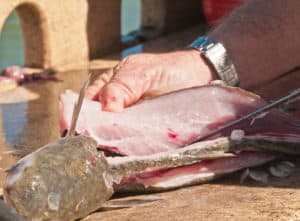
Artificial Bait for Saltwater Fishing
Artificial baits, such as scented plastics or hard baits, can also be effective for saltwater fishing.
These baits can mimic the look and smell of natural bait, and they can be used with a variety of rigs and techniques.
Additionally, there are a few more artificial baits worth mentioning that have proven to be effective in saltwater fishing:
Twitchbait or Jerkbait: Tempting Saltwater Predators with Precision
One of the most versatile options for saltwater fishing is the twitchbait or jerkbait.
This lure is designed to be retrieved with repeated jerks and pauses, imitating the erratic movements of wounded baitfish.
The sudden stops and starts trigger a response in predators, even when they’re not actively feeding.
Look for jerkbaits with realistic finishes, lifelike swimming actions, and internal rattles for added attraction. A few standout options include the Rapala X-Rap and the MirrOLure MirrOdine.
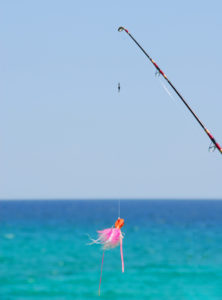
Topwater Lures: Creating Explosive Strikes
For an exhilarating and visually captivating fishing experience, nothing beats topwater lures.
These surface baits create a commotion on the water’s surface, mimicking the movements of prey species like mullet or injured baitfish.
The explosive strikes that result from using topwater lures are a thrill every angler seeks. Try the Heddon Super Spook or the Zara Spook for enticing topwater action.
Bucktail Jigs: A Deadly Weapon for Anglers
The bucktail jig is a timeless classic that has been fooling saltwater game fish for generations.
Featuring a lead head adorned with deer hair or synthetic fibers, these jigs provide a lifelike appearance and undulating action.
Bucktail jigs are effective in a variety of fishing situations, from shallow flats to deep-water reefs.
The SPRO Prime Bucktail Jig is an excellent choice for attracting strikes.
Fishing Spoons: The Gleam of Success Provoking Strikes with Fishing Spoons
A staple in every angler’s tackle box, the fishing spoon is a metal lure with a concave shape that produces a mesmerizing wobble as it’s retrieved.
Spoons are known for their versatility and ability to cover water quickly, making them ideal for locating fish.
The Johnson Silver Minnow Spoon and the Acme Kastmaster are highly regarded spoons that have consistently produced results.

Soft Plastic Baits: Supple Seduction Tempting Fish with Lifelike Soft Plastic Baits
Soft plastic baits are incredibly versatile and can imitate a wide range of saltwater forage, such as minnows, shrimp, and baitfish.
They come in various shapes and sizes, allowing you to tailor your presentation to the specific species you’re targeting.
The Zoom Super Fluke and the Berkley Gulp! Saltwater Swimming Mullet are exceptional soft plastic options that have proven effective.
Paddle Tail Swimbaits: Unleashing Realistic Motion for Success
Paddle tail swimbaits are soft plastic baits designed with a distinct tail that produces a lifelike swimming action when retrieved.
These baits excel at imitating injured baitfish and can entice strikes from a variety of saltwater predators.
Look for swimbaits like the Keitech Swing Impact or the Storm Wildeye Swim Shad for their realistic appearance and enticing movements.
Jigging Spoons: Maximizing Your Catch with Precision
Jigging spoons are heavy metal lures that are typically used for vertical jigging or casting and retrieving.
They are particularly effective for deep-water fishing and targeting bottom-dwelling species like snapper, grouper, and halibut.
The Hopkins Shorty and the Williamson Benthos Speed Jig are highly regarded jigging spoons known for their ability to trigger aggressive strikes.
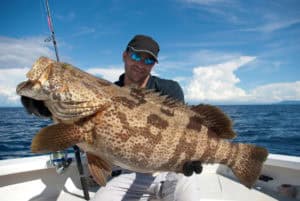
Tailoring Success: Lure Selection for Target Species, Conditions, and Baitfish Behavior
When selecting artificial lures and baits, keep in mind the specific characteristics of your target species, the prevailing conditions, and the behavior of the baitfish in the area.
It’s essential to have a variety of options at your disposal to adapt to changing fishing situations and maximize your chances of success.
Tips for Using Saltwater Fishing Bait
Now that we’ve covered the different types of bait for saltwater fishing, let’s take a look at some tips for using it effectively.
- Keep your bait fresh. Whether you are using live bait or cut bait, it’s important to keep it fresh to attract fish. Make sure to store it in a cool, dry place and replace it if it starts to smell or look old.
- Match your bait to the conditions. As we discussed earlier, the water conditions can affect what type of bait you should use. Make sure to match your bait to the depth, clarity, and temperature of the water you are fishing in.
- Vary your technique. Fish can be picky, so it’s important to vary your technique when using bait. Try changing the speed or movement of your bait, or switch to a different type of bait if you aren’t getting any bites.
- Pay attention to the tides. The tides can affect the movement and behavior of fish, so it’s important to pay attention to them when fishing. Try fishing during the incoming or outgoing tide, as this can be a good time to catch fish.
*Pro Tip: To narrow down the right bait to use, it’s important to identify the target species. Professional anglers often switch up their tactics, so don’t be afraid to try a new bait. Experimenting with different bait options can often lead to the best results.
“Calling all saltwater fishing enthusiasts! Dive into our comprehensive article on Fishing Tips: Key Advice for Saltwater Fishing Enthusiasts, where you’ll find invaluable insights and expert guidance to enhance your fishing game. Don’t miss out on this must-read resource!”
Go Fishing
Choosing the right bait for saltwater fishing can make all the difference in catching a big fish or going home empty-handed.
By considering the type of fish you are targeting, the water conditions, and the time of day, you can select the most effective bait to increase your chances of success.
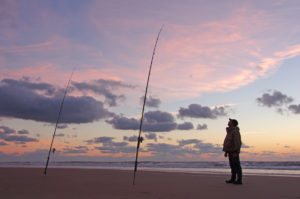
Whether you prefer live bait, cut bait, lures, or artificial baits, there is a type of bait that can help you reel in more fish.
Remember to keep your bait fresh, adapt it to the prevailing conditions, vary your fishing techniques, and pay attention to the tides.
These factors will greatly contribute to a successful day of saltwater fishing. So, pack your gear, choose your bait wisely, and head out to the waters, ready to make the most of your fishing expedition.
